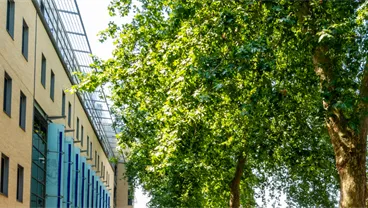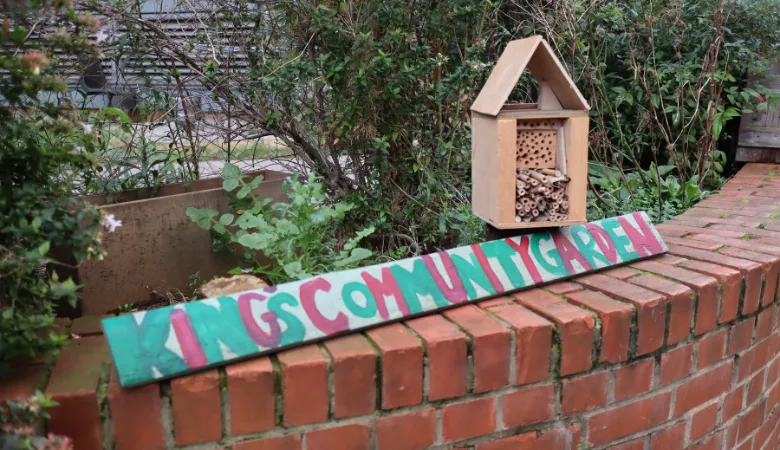About climate and sustainability at King’s
Enabling societal transition to environmental sustainability is a...
King's is committed to enhancing the habitats on our campuses, halls of residence and sports grounds for the benefit of our students, staff, visitors and wider communities.
Protecting and enhancing biodiversity on our campuses and open and outdoor social spaces is not only beneficial for wildlife, it can have significant wellbeing benefits for everyone using these spaces.
We have worked with the London Wildlife Trust to create a Biodiversity Action Plan for the university. This sets out the good practice and existing ecological value of our sites, such as initiatives including bird and bat boxes, and green roofs at the Maurice Wohl Clinical Neuroscience Institute. It also sets out where King's can improve habitats and green infrastructure under four broad themes:
As an urban university, we aim to increase and improve access to nature through the spaces we manage. The Memorial Garden at Guy's Campus is open to our students and staff, as well as the general public, providing green space in a central London location.
In June 2022, part of a silver-medal winning RHS Chelsea Flower Show 2022 garden was gifted from St Mungo's to King's, and was installed at Guy's Campus. Named the ‘Waste to Wildlife Garden’, in 2023, it uses recycled building materials to provide a mini green oasis where biodiversity can flourish, establishing a wildlife haven in a busy urban setting. Where possible, we work with local partners such as Business Improvement Districts to improve local biodiversity and access to nature including working with Team London Bridge to create a 'pocket park' accessible to the public and located outside the Greenwood Theatre.
Landscapes, contractors and any others working on our sites should be aware that under Section 211 of the Town and Country Planning Act (1990), any tree in a conservation area is also protected even if a Tree Preservation Order (TPO) is not in force. There is a requirement to notify the local planning authority six weeks before any planned works on trees in a conservation area. Tree Preservation Orders (TPOs) protect trees that make a significant impact on their local surroundings, and it is an offence to cut down, lop, top, uproot, willfully damage or willfully destroy a protected tree without permission from the local Council. In 2012, King's commissioned a tree condition survey across its estate, this involved a visual assessment of trees to assess tree health and to outline any proposed remedial works. Results of this survey are available by contacting sustainability@kcl.ac.uk. The assessment did not include determining whether any TPOs covered the trees, so it is still necessary to check before undertaking any work to trees onsite, and obtain any necessary consent. Since 2021, the sustainability teams at King’s, along with dozens of volunteers, have planted more than 1,800 trees and hedgerows across the estate with plans to continue planting into 2030.

Across King’s campuses are several pocket gardens – small, planted spaces, containing flora that supports urban biodiversity and enhances the aesthetic appearance of the site. At Guy’s campus, pocket gardens are located at the front of Henrietta Raphael House, and the front of Shepheard’s House. The boundary of the Guy’s lawn is planted with various seasonal flowers and directly underneath the memorial arch is also planted. The waste to wildlife garden is located at the rear of New Hunts House and several matching planters are located the front of New Hunts House. King’s also have two community gardens, open to staff, students and the wider campus communities. The Guy’s Community Garden is located at the entrance of The Wolfson Centre for Age Related Diseases. The Denmark Hill Community Garden is located at the rear of the WEC building. Both gardens provide an opportunity for people to hone and exchange their gardening skills and grow flowers and vegetables for their own consumption, It’s also a great place to meet and make like-minded, green fingered friends and exchange tips on how to cultivate a garden.
King’s Community GardenVolunteer in King's Community Gardens
In May of 2024, Urban Bees installed 24 bee hotels and 6 bee observations boxes across King’s estate, for the purpose of supporting the survival of urban bees. Located on the grounds of residential apartments, at both sportsgrounds and at each of our London campuses, they offer refuge for urban solitary bees throughout the year. A third of bee species are under threat mainly from habitat loss which robs them of nesting sites and food, so installing bee hotel and observation panels are crucial. These bees are excellent pollinators, and they don’t sting. Bee hotels are wooden boxes for cavity-nesting solitary bees, whereas the bee observation boxes are larger wooden nesting boxes with a perspex cover, designed to enable people to see the nesting habits of wild, solitary bees. Urban bees have worked with King’s gardening teams to greatly improve the forage for bees throughout the year. A QR code on the observation boxes and the Urban Bees blog gives more information about the good work being done to support our pollinators.
Read the Urban Bees blogEnabling societal transition to environmental sustainability is a...
Building sustainability into King’s actions and operations
Learn about how you can be more sustainable within and beyond King's